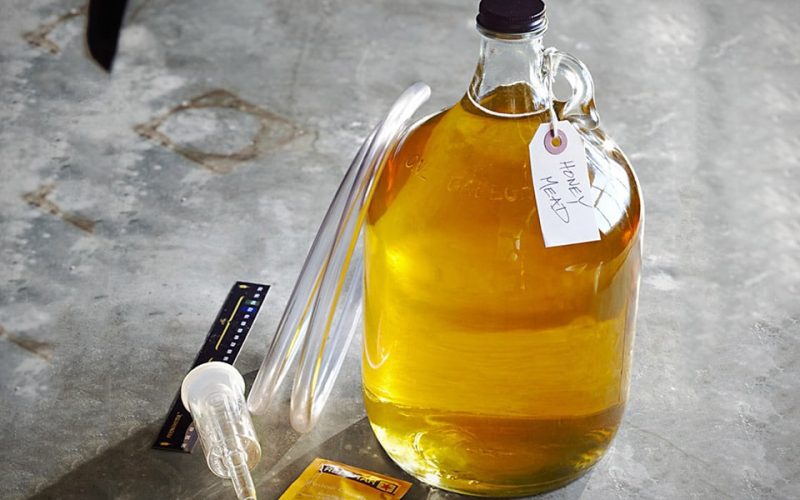There has been a lot of awareness on the benefits of eating honey for decades. Honey isn’t only wonderful as a sweetener but also has lots of benefits to offer the skin, and for this reason, it has been used a lot in the cosmetic industry.
However, there is one by-product of honey that less attention has been paid to especially recently and it is nothing else but the beverage called Mead. Mead, sometimes referred to as the drink of the gods is a traditional beverage made from water, honey, yeast, or even bacteria culture.
Mead is one of the oldest drinks in the world as it has been cultivated and consumed for centuries around the world. The question this article seeks to answer is whether or not Mead has any health benefits and also if there are pitfalls to take note of.
What is Mead?
Mead also is known as honey wine is an old alcoholic beverage that is made from fermented honey. Mead has been in demand as far back as four thousand years ago since that makes it one of the oldest drinks in the world. It may further interest you to know that Mead has a place in the history of many ancient cultures in Africa, Asia, and even Europe.
Although Mead is similar to wine, beer, and cider, Mead is in a class of its own primarily because it’s fermentable sugar is honey. The basic ingredients for the production of Mead is water, yeast, and honey.
However, some people add ingredients such as roots, grains, fruits, spices, herbs, and flowers. The alcohol content in Mead varies a lot but it usually falls between 5% to 20%. The taste flavor for Mead ranges from very dry to very sweet and you can get it both in still and sparkling versions.
Does science support claim health benefits of Mead?
Mead was believed to be associated with good health and vitality in ancient history. This drink was referred to as the drink of the gods in Greek mythology, and it was allegedly offered to Greek worksite warriors after battles to help them heal faster and regain lost strength.
Till this day a lot of people believe that mead has a lot of healing properties and is highly beneficial to human health.
However, evidence to support this claim is minimal and the benefits people try to connect to the consumption of mead is often linked to the benefits of honey which is its primary ingredient.
It is also believed that meat has some probiotic benefits as a result of the fermentation process that the honey has to go through
Therapeutic benefits of honey
Honey has been valuable and used for centuries not only for its culinary benefits but also for its therapeutic benefits.
Studies over the years have shown that honey has antioxidant and antimicrobial properties and these two excellent characteristics of honey explain why it has been used both in ancient and modern medicine to treat quite a number of ailments and conditions ranging from common cold to sunburns.
Up till today, honey is used topically on the skin to treat some skin wounds, infections, and conditions as well as consumed orally to treat a sore throat and cough.
Some people claim that since mead is made from honey, all the wonderful properties of honey are also contained in the drink, but there is no scientific proof to back up such claims up till date.
More research will have to be carried out to ascertain whether fermented honey possesses the same properties as the unfermented version before we can wholeheartedly agree that mead contains the exact features that unfermented honey contains.
Probiotics and gut health
Mead is often believed to be a health tonic because of its potential probiotic benefits. Probiotics are what people often referred to as good bacterias that can be beneficial to one’s health when consumed in large quantities. Probiotics would help improve your immunity and your gut health.
Although it is only much recently that scientists began to understand the benefits of probiotics to human health. However, it has been discovered that probiotics can potentially help with treating or preventing conditions such as allergies, cancer, heart disease, and even gastrointestinal (GI) disorders.
Sadly there is currently no specific research to find out whether or not mead has benefits to the human health and also to evaluate it as a source of probiotics.
In addition there could be significant variation in the quantity of probiotics in different types of meed. The process of fermentation and the addition of other ingredients could interfere with the amount of probiotics left in the final product.
Something else worthy of note is that the alcohol content of mead could counteract with whatever health benefits it was supposed to have because excessive consumption of alcohol has been associated with negative reactions because excessive consumption of alcohol has been associated with negative reactions in your gut bacteria.
Until further research is conducted and results achieved, it cannot be fully ascertained whether or not mead has any probiotic benefits .
What are the potential downsides of drinking mead?
Even though this drink of the gods has been praised for its numerous assumed health benefits, there are some downsides it is vital that you take note of before you begin to fill your glass. One of these downsides is the alcoholic content of this drink.
As earlier stated the alcoholic content of me the ranges between 5% to 20%. for the sake of comparison regular grape wine has an alcoholic content of between 12% to 14%.
It is no newsflash that excessive consumption of alcohol could lead to a number of dangerous health problems including liver damage, impaired digestive and immune system function, and also systemic inflammation.
According to the American dietary guidelines it is advised that men limit their daily alcohol intake to 2 servings per day, and women have 1 serving per day.
Considering the relatively high alcoholic content of mead, it’ll be straightforward to take more than is necessary especially when it is consumed with the assumption that it is beneficial to health.
It is imperative that you treat me the way you would handle every other kind of alcohol and drink it with caution.
Allergic reaction
One good thing about mead is that it is well tolerated by a large number of people. Depending on what is added during the fermentation process, mead is usually gluten-free.
However, if you have a gluten allergy, make sure to check the content of the Mead you are about to consume just to be sure no ingredients that contain gluten was added during the brewing process.
For people who are allergic to honey and react badly to alcohol, mead may be potentially dangerous. And if you have ever had an allergic reaction to bee pollen or honey, it is best to stay away from mead just to be on the safe side.
Also, if you are bothered about your calorie intake, mead is not the drink for you as it has a high-calorie content which could affect your health negatively.
When you drink any alcoholic beverages in excess, it can increase your risk of obesity and diabetes, increase your blood pressure, and also raise your blood triglycerides.
So while you may be in the mood to tap some of nature’s goodness by consuming a natural drink like mead, consider what effect it would have on your health.









Weird no studies on the world’s oldest drink